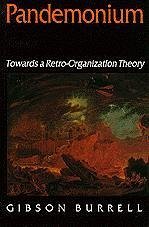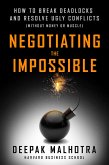`A truly bizarre and sometimes filthy historical canter through abatoirs, satyriasis and Noel Edmonds' House Party, among other things, towards a theory of organisation' - The Times 'The author pursues a vigorous polemic on organisational development' - Financial Times In this irreverent and inventive book, Gibson Burrell seeks to circumvent the established frameworks which have defined our understanding of organization and organizations. He brings us tales from under the edge which enmire us in the nether side of modernist organization. By looking backwards deep into the history of Western societies, and sideways across the broad domain of social and cultural theory, Pandemonium disconcerts and invigorates the domain of the study of organizations. Through his experimental device of the two-directional text, Burrell offers multi-layered meanings and a metaphor for the rejection of linearity. This is not an organizational behaviour textbook but an exploration that will take organization theory into a new era.
Burrell has produced a retro-organization theory that seeks to describe the underbelly (or is it the reality?) of orgnizations in pre-enlightenment terms. Organizations are as pandemonium.... Whether you agree with retro-organization theory or not, is up to you. Personnally I find it useful to view organizations where the rational andthe primordial interact and often confront each other.... If we dare look deeply through pandemonium's lens, however, it has the potential to shed a disturbing light on the issues and challenges facing the design and introduction of information systems and technologies into healthcare organizations and the role of information, now and in the future. In retrospect it may also shed light on some fo the problems surrounding its past history' - British Journal of Healthcare Computing & Information Management `Pandemonium is an irreverent and critical look at management, education and the so-called gurus. It takes as its basic premise the fact that in real organizations there is chaos, even pain, torture, death and destruction, if you look hard enough. More importantly it points out the continuing failure of organizations to recognise the real contributors - the workforce. It is a well researched and written book' - Professional Manager `A truly bizarre and sometimes filthy historical canter through abatoirs, satyriasis and Noel Edmonds' House Party, among other things, towards a theory of organization' - The Times 'The author pursues a vigorous polemic on organizational development' - Financial Times `Two volumes in one, Pandemonium is a disorganisationally challenging contribution to the postmodern theory of organisations which systematically questions the underlying assumptions and values of contemporary administrative science and organization theory. The MBA will never be the same again' - Bryan S Turner, Deakin University `Pandemonium is a dark, gothic place, full of danger and enchantment for all who enter its labyrinth, a retro-vision that seeks to ensnare, disarm and disturb all who enter, whatever sense they make from the many opportunities it provides' - Stewart R Clegg, University of Technology, Sydney `Undoubtedly, Burrell, through Paradigms, has been one of the main contributors to contemporary organizational thinking, and indeed, to a not insignificant degree, has influenced the way the subject has developed' - British Journal of Industrial Relations








